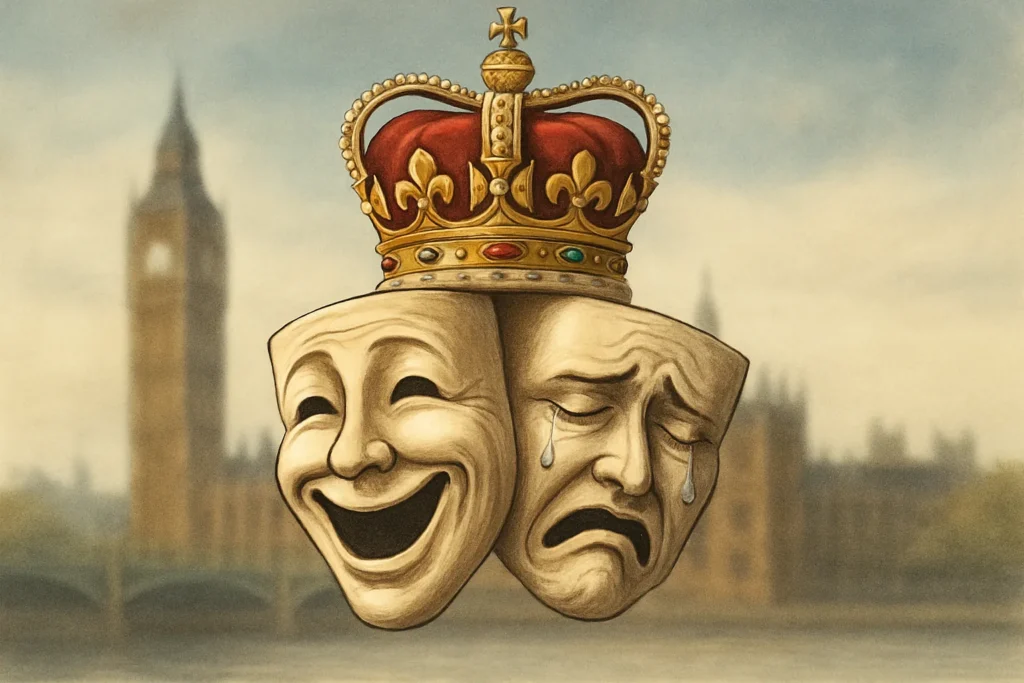Late-Night Satire and the Royal Outsiders
Viewers tuning in to Saturday Night Live’s familiar “Weekend Update” found a sharp punchline waiting for them: when it came to the highly publicized UK-US trade deal, the only British demand was that America “keep” Prince Harry and Meghan Markle. Colin Jost’s delivery was effortless, and the audience erupted in laughter, but for those who have followed the pair’s transatlantic odyssey from Buckingham Palace to Montecito, California, the message hit with unmistakable force.
This wasn’t just a well-timed jibe—it was comedy holding up a mirror to a cultural saga still unfolding. The SNL moment arrives on the heels of Prince Harry losing his bid for taxpayer-funded security on UK visits, another chapter in the saga of his and Meghan’s withdrawal from royal duties. The couple, often the subject of feverish tabloid scrutiny and social media vitriol, now find themselves targets for late-night political satire, no longer shielded by the pageantry or the protocols of monarchy.
According to renowned media historian Dr. Sarah Churchill, “Satire is always a barometer. When SNL weighs in on Harry and Meghan as symbols of national exchange, it signals their transformation from royal figures to emblematic outsiders.” For progressives watching this unfold, there’s a dual challenge: how do we critique the monarchy’s exclusionary traditions while examining American media’s own appetite for scapegoating foreign figures on the basis of race and nonconformity?
Beyond that, it’s impossible to ignore the layers at play: British discomfort with royal dissenters is amplified, translated, even caricatured for American consumption. Sometimes, as the SNL bit shows, the border between reality and ridicule is vanishingly thin.
Beneath the Laughter: The Politics of Exile and Trust
Not every punchline lands the same way. At a glance, Harry and Meghan’s lives—marked by $14 million mansions and celebrity friendships—appear like something out of a California dream. Their public outings, such as the recent viral night at Beyoncé’s Cowboy Carter Tour, generate glamorous headlines and Instagram stories. But beneath this surface is a story of painful estrangement and yearning for reconciliation.
After the infamous so-called “Megxit,” Harry has repeatedly stated his desire to forgive his family and build bridges with his father, King Charles III, and brother Prince William. Following the recent court ruling denying security for his family in Britain, Harry shared his regret that his children might never fully experience his homeland. But press reports reveal a different undercurrent: as one confidante told The Sunday Times, “I genuinely think nobody trusts him and that’s the bottom line.”
“Satire like SNL’s isn’t just entertainment—it’s a commentary on what we’re willing to mock, what we fear, and who we’re willing to cast out when social norms are threatened.”
The media’s love affair with Harry and Meghan’s self-exile speaks to more than celebrity voyeurism. It reflects a broader discomfort with anyone—particularly women and people of color—who challenge the status quo. Meghan Markle, in particular, has shouldered attacks both overtly racist and steeped in genteel xenophobia, as documented extensively by the Guardian and confirmed in analysis by race and media scholars at Cambridge University. When Meghan stepped away, she upended a very old order—and the backlash, disguised as satire or concern, is part and parcel of that disruption.
Even so, SNL’s choice to lampoon the Sussexes isn’t a matter of pure meanness. Rather, it’s reflective of the odd liminal space the couple inhabits: too royal for America, too American for royalty. Many recall Diana, Princess of Wales, and her struggle with both the press and palace conventions. Yet unlike Diana’s narrative—one ultimately ending in tragedy—Harry and Meghan’s story is about contentious survival, not just escape.
The Limits and Responsibilities of Comedy—and Public Discourse
Public figures are fair game in American comedy, but where’s the line between roasting and reinforcing stigma? As historian Jill Lepore reminds us, “Comedy is powerful because it tells us what’s thinkable—and sometimes, what’s permissible.” In the case of the Sussexes, SNL’s ribbing partakes in a longer tradition of using humor to express cultural anxieties about outsiders, race, and belonging.
Take a step back and it’s easy to see how jokes like Jost’s play into familiar tropes—the U.K. as a disapproving parent, America as a haven for misfits, Harry and Meghan as the problematic stepchildren. This narrative obscures the real complexities: Harry’s credible concerns for his family’s security and well-being, Meghan’s desire to be more than just a royal accessory, and the deeply entrenched racialized narratives that have long shaped British and U.S. media depictions of women of color.
Viewing SNL’s joke through a progressive lens raises critical questions about collective responsibility. How should comedians, journalists, and citizens engage with figures whose lives are as much tabloid fodder as they are case studies in navigating institutional bias? And what does this say about us, as a culture, when we find catharsis not just in laughing at the powerful, but at those fleeing power’s burdens?
Liberal values demand more: empathy for those bucking tradition (even imperfectly), skepticism toward both monarchical and media dogmas, and a willingness to interrogate our own entertainment. Comedy can spark dialogue and even push us toward justice—but only when we recognize, as Marshall McLuhan put it, that “the medium is the message.” Laughter alone cannot resolve deep wounds—be they personal, familial, or national.

